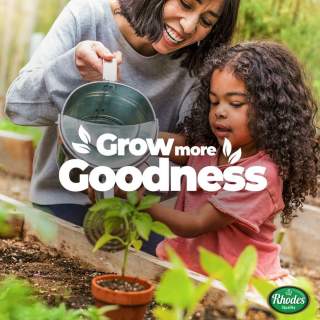Sixty SA schools to get sustainable food gardens from Rhodes Quality
Grow with Goodness and Buy a Pack, Feed a School
Rhodes Quality has launched a new initiative in partnership with social enterprise, Reel Gardening called Grow with Goodness, with the aim of growing sustainable food gardens for sixty South African schools.
Each time you buy a Rhodes Quality 100% fruit juice over the summer period, you will be helping Rhodes Quality feed local vulnerable communities and most specifically hungry children.
“We are very excited to kick-off the summer with such a meaningful initiative and that’s why we’ve partnered with Reel Gardening to help us grow school gardens filled with goodness this summer,” says Tamara Patel, Brand Manager for Rhodes Quality at RFG. "The future of South Africa depends on the seeds we sow and the kindness we show today.”
“A portion of this summer’s juice sales will be funding the growth of community gardens at sixty schools around the country,” she explains. “We’re working hard to assist vulnerable communities and feed hungry children and we’re asking all South Africans to join us as we plant gardens around South Africa.”
“South Africa's deteriorating food security issues have been exacerbated by the Covid-19 pandemic, roughly 11% of our population are suffering from hunger,” Patel says. “With this initiative we are hoping to grow South Africa with goodness.”
“Our new summer brand campaign is centred around ‘go with goodness’ which effectively means that we want to provide fresh, wholesome nutrition to as many schools as possible,” she explains. “Our 100% fruit juices make it easier for you and your family to go with goodness everyday while helping our local communities grow with goodness too.”
Patel explains that it’s really easy to get involved, “Add any one litre Rhodes Quality 100% fruit juice to your shopping cart in stores around South Africa and our team will do the rest.”“Good food is imperative for children’s growth, nourishing their tummies and minds is so important to make sure the children of South Africa grow up strong by eating good, wholesome food,” she says. “What’s more with our partnership with Reel gardens the children will also learn about planting and growing produce in an accessible, sustainable and fun way.”
“We couldn’t have asked for a better partner to help us bring this initiative to life, a business started by Claire Reid at age of 16 has grown into an innovative, award-winning social enterprise that delivers a real planting revolution with a focus on getting people grounded,” Patel says. “Since their inception they have reached almost 3,000 schools and communities, and we look forward to our journey with them.”
“Growing food not only impacts a person’s ability to take control of their food security,” says Reel Gardening founder, Claire Reid. “It has a myriad of other benefits, including instilling a connection to nature, responsibility, patience, relaxation and problem solving. Whether a few pots on your windowsill or a whole veggie patch in the garden, the process of growing food will improve your quality of life.”
“Our delicious range of 100% fruit juices aren’t the only source of goodness,” she adds. “Goodness is also found in the hearts of communities that work together to keep tummies full, join us to help communities continue to grow.”
How it works:
- It all starts with you buying any 1L Rhodes Quality 100% fruit juice.
- Reel Gardens then visit 60 schools around the country and deliver everything needed to start a wholesome vegetable garden.
- Volunteers and teachers are trained to care for the garden. From planting to harvest, school children can get involved in and excited about the process
- Schools are now ready to tend their gardens, watch goodness grow and reap the nutritious rewards!
For more information visit the website or Facebook and Instagram #GROWWITHGOODNESS
Turn Your Garden into a Carbon Sink
More carbon is sequestered in the planet’s soils than in living plants and the atmosphere combined. Over the past century, however, soil carbon has been widely depleted, mostly due to unsustainable land management practices that disrupt natural processes that create carbon-rich organic matter.
Change is needed and it is appearing in the recognition that soil health is an essential component of slowing the pace of global climate change by offsetting annual increases in atmospheric carbon. There is a revolutionary agricultural practice that recognizes the importance of building healthy soils by replacing the organic matter that has been lost. This new practice is called carbon farming.
1. Fertilise the soil with compost. Compost enriches soil and adds essential nutrients which maintain soil health
2. Cover bare soil, either with cover crops or mulch to keep moisture in the ground and minimize soil disturbance
3. Plant trees and shrubs because they absorb more carbon dioxide with their trunks and branches than smaller plants.
4. Plant perennials. - they require minimal to no soil disturbance and can stick around for many years
5. Disturb the earth as little as possible - digging the soil releases stored carbon into the atmosphere.


